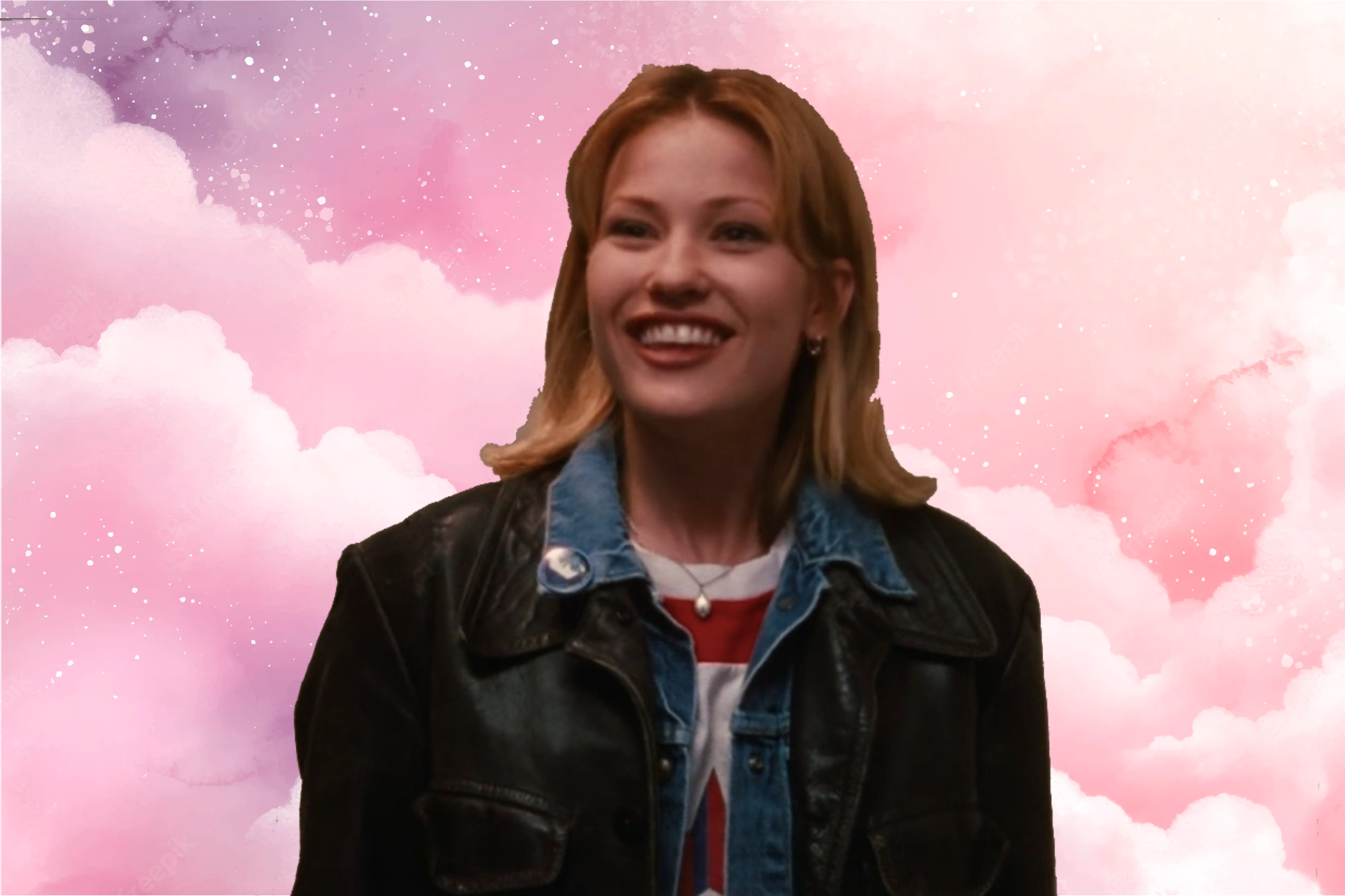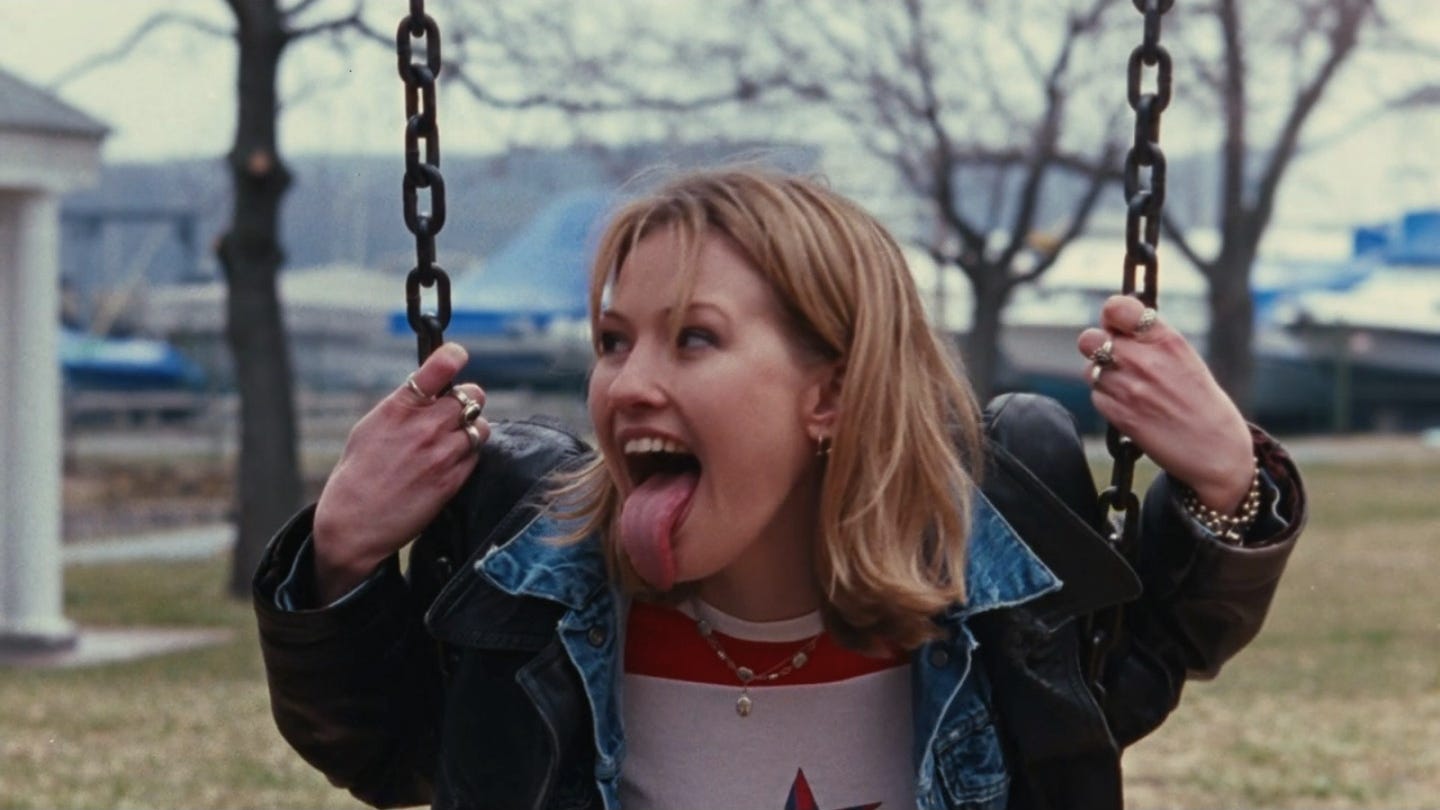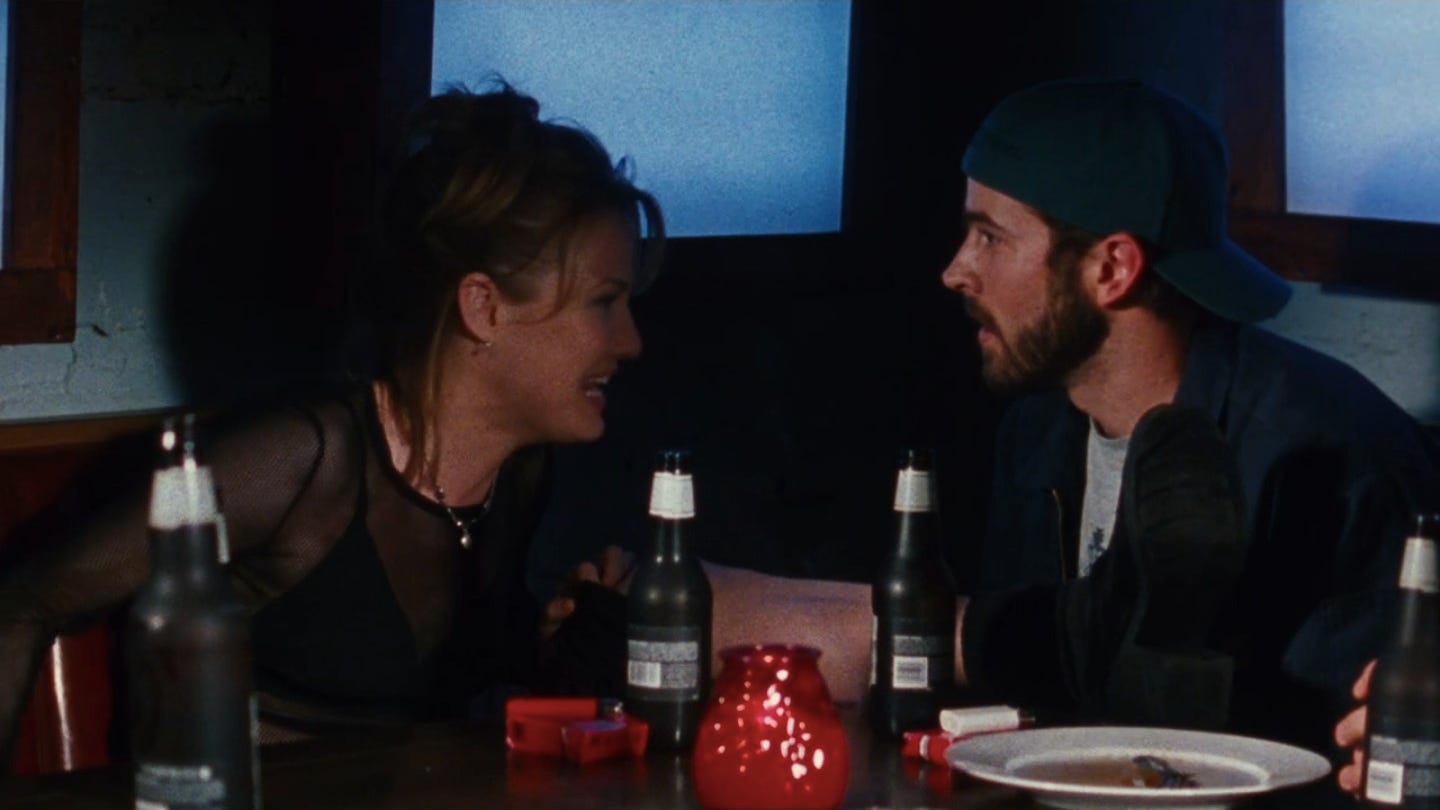Paging Dr. Lesbian - Chasing Amy's Manic Pixie Dream Lesbian
This is the Sunday Edition of Paging Dr. Lesbian. If you like this type of thing, subscribe, and share it with your friends. Today’s topic arose from a discussion with one of my illustrious paid subscribers. If you want to join their ranks, (and further support my work), upgrade your subscription here. The plot of the 1997 film Chasing Amy is as follows: Holden (Ben Affleck), a comic book writer from New Jersey, meets Alyssa (Joey Lauren Adams), a fellow comic book artist. He is immediately smitten with Alyssa and is devastated to learn that she’s a lesbian. He gets over his initial shock and they become close friends, only for him to finally confess his undying love for her. She is angry at first, but they eventually share a rain-soaked kiss and start dating. Alyssa’s friends aren’t happy with this development, and neither is Holden’s best friend Banky (Jason Lee), who is constantly making homophobic remarks. Holden ruins things with Alyssa when he reacts poorly to finding out about her sexual history, and Banky feels like Holden’s chosen Alyssa over him. Holden decides the best way to rectify things between the trio is to propose a threesome between them all. Suffice it to say, this doesn’t end well. Considering the plot of the movie, it probably won’t surprise you that Chasing Amy just might be the most divisive lesbian film of all time (if you can even call it that, which you probably shouldn’t). Chasing Amy was directed by low-budget auteur Kevin Smith and represents the third film in his View Askewniverse series (following Clerks and Mallrats). The plot of the film was inspired by Smith’s own life. He was dating the film’s star, Joey Lauren Adams, and their relationship fell apart when he became insecure about her more worldly experiences. He told Criterion the film was a means for him to exorcize his demons and “a sort of penance/valentine for the woman who made me grow up, more or less.” The film was also inspired by real-life lesbians, if you can believe it. Smith and producer Scott Mosier happened to meet Guinevere Turner and Rose Troche, the lesbian filmmakers behind the 1994 film Go Fish, at Sundance that year. They became friends and exchanged stories, and Mosier developed a bit of a crush on Turner. Chasing Amy was in part inspired by a dream-like sequence in Go Fish wherein one of the lesbian characters is berated by a group of women for sleeping with a man. (This, of course, is just a short scene in Go Fish, while it’s the basis for the entire plot of Chasing Amy.) Turner herself has a small cameo in the film as the woman who introduces Alyssa at the lesbian bar. Watching the film, it’s obvious that it’s not what you might call a lesbian film, and Smith certainly never intended for it to be considered in this way. To put it simply, it’s a coming-of-age story about a straight man where a lesbian is the catalyst for his growth. Smith has said that Holden is a stand-in for himself, and it’s obviously a self-deprecating move on the part of the director. Smith is clearly aware that Alyssa – and indeed, the notion of lesbianism itself – is being used to further the development of this immature man, but he still does it. Indeed, the entire moral of the story is that Alyssa teaches Holden how to be a better person (he even writes a comic about their relationship to prove how much he learned). What Alyssa has gained from the relationship is not clear. She’s a manic pixie dream lesbian, defined by her mystery and charm more than her own desires. Reactions to the film over the years have been all over the place. When it premiered in 1997 it received generally positive reviews by critics from both gay and straight publications. The Chicago Tribune wrote that “Chasing Amy pursues sexual issues without a snicker,” while The Advocate wrote that the film “eschews political correctness to explore sexual identity with more thoughtfulness than we’ve seen before, at least from a filmmaker who happens to be a 26-year-old straight guy.” Many critics saw it as Smith’s best work up to that point. Contemporary reactions to the film have been far less positive. A quick glance at my Letterboxd page – which includes almost exclusively sapphic users – indicates that the film is strongly hated by many queer viewers today. One reviewer was so upset by the film that they called for every copy of it to be burned, and other reviews on the site are similarly vitriolic. At the time of its release, there were certainly many queer viewers who took issue with the film’s content as well, but the condemnation wasn't as total as you might think. Turner told Buzzfeed that when she first saw the film she thought the lesbians were going to hate it, but that it didn’t end up being quite as reviled as she thought. While the film’s reputation has in many ways diminished over the years, there are still those who wish to resuscitate its poor standing. A recent article in Paste Magazine claimed that the film is misunderstood, while Collider called it “An Earnest Exploration of Sexual Fluidity.” Queer filmmaker Sav Rodgers is even making a documentary about the film, having previously done a Ted Talk where he described how the film saved his life. It was the first “queer” film Rodgers had ever seen, and it meant a lot to him that the gay characters in the film “were intelligent, funny, and out.” It’s clear that opinions on the film have varied greatly over the years, and your perspective on the film will likely depend on the vantage point from which you are viewing it. As an intellectual exercise, Chasing Amy certainly gives the viewer a lot to unpack. What happens when an “outsider” enters an insular group like the lesbian community? What are the social consequences of toxic masculinity? And is that what straight men really think about lesbians? But, if you’re coming to the film from an emotional standpoint, especially as a queer viewer, it’s a different story. I can only speak for myself here, but I’ll admit I had a pretty difficult time getting through the film. I had to pause it several times when it became too uncomfortable for me to bear, and I would rate my overall experience of watching the film as rather troublesome. There are several things that make it something of an unpleasant watch, at least for contemporary queer viewers who haven’t quite come around to the notion that it’s actually quasi-progressive. Though Alyssa is an extremely charming character, the way she is treated by the other characters (mainly the two men) is pretty hard to swallow. The constant homophobic slurs are one thing, but it’s also difficult to watch a lesbian (or queer) character whose experiences are primarily defined and funneled through the perspectives of the men around her. What makes Alyssa’s treatment in the film even more upsetting is that she’s actually the most compelling, well-acted character in the film. Joey Lauren Adams (with her doll-like voice that recalls Jennifer Tilly) is totally exhilarating to watch, and Alyssa has many interesting opinions and stories that, in another context, I would love to hear more of. One of the best scenes in the film comes early on, just after Holden and Banky have discovered Alyssa is a lesbian. Banky is complaining about how dangerous oral sex can be, and he and Alyssa become increasingly animated as they exchange stories about their respective sex injuries. (It’s an obvious allusion to the scar-comparing scene in Jaws.) There is actually something oddly charming and sweet about this conversation, where a close-minded straight man jokes with a good-natured lesbian about what they have in common. Alyssa has several powerful monologues of her own, scenes that make you want to root for her despite her association with these pigheaded men. The scene after Holden confesses his love to her and she tells him she can’t just change who she is for him is dramatic and profound, only it ends with her disavowing what she’s just said. Her reaction to Holden’s slut-shaming and his offensive proposal of a threesome later in the film are equally as captivating, and Adams gives it everything she’s got here. But the central dilemma is baked into the film’s premise: Alyssa is a lesbian character written by a straight man in order to explore his own issues with masculinity and intimacy. Indeed, the most unrealistic aspect of the film is the fact that Alyssa willingly hangs out with these ignorant straight men when she could be hanging out with her lesbian friends instead. In fact, apart from the lesbian bar scene at the beginning, the only time we see Alyssa’s friend group is in the short scene where Alyssa finally admits that she’s dating a man. “Another one bites the dust,” her friend says, casting Alyssa’s community in a rather negative light. Is this why Alyssa doesn’t want to hang out with them? Certainly, not every queer person hates Chasing Amy with a passion, and some have even worked to reclaim it for the queer community. In the case of such reclamation, it all depends on how you read Alyssa. If you read Alyssa as a lesbian who “goes straight” when she meets a special guy (which is the most straightforward way to describe the film), then it's hard to get around the offensive implications therein. But one could also read the film as a discussion of the fluidity of sexuality and the problem of biphobia in both the queer and straight communities. This second reading is the one proposed by some of the critics who have argued that the film is actually misunderstood. If we look at the film’s intent, it is clearly a straight man’s coming-of-age story that just so happens to center on a lesbian character. (Smith himself has said as much.) With this framework in mind, it’s hard to expect anything more than a stereotype-laden narrative about lesbian identity. None of us really asked for this, but it does give us an idea of how straight men might work through their own preconceptions about lesbianism, though this doesn’t turn out very well for the lesbian in question. It’s not necessarily fair to evaluate a film based on what it could have been rather than what it is, but it’s hard not to consider the what-ifs in this situation. The biggest what-if, of course, is the question of bisexuality. What if the film was actually about the illegibility of bisexuality? It’s certainly representative of that problem considering the absence of bisexuality as a framework therein, but the concept itself isn’t actually explored at all. This problem is not limited to Chasing Amy – the seeming irrepresentability of bisexuality permeates pop culture far and wide. As Carmen Maria Machado writes in her essay about Jennifer’s Body (a work of bisexual brilliance): “And like homosexuality, but unlike heterosexuality, bisexuality is temporally unmoored, unfixed from the sexual activity or desire of the current moment; a true teleological orientation.” Bisexuality doesn’t easily fit into boxes, nor is there one overarching narrative of the experience. Bisexuality is not actually irrepresentable, of course. In a sea of often misguided portrayals of bisexuality, Desiree Akhavan’s ingenious series The Bisexual stands out as one of the few examples of a uniquely bisexual story. Like Alyssa, Akhavan’s Leila has been out as a lesbian for many years until she begins to realize she’s actually attracted to men, much to her friends’ chagrin. But, unlike in Chasing Amy, The Bisexual actually names these issues for what they are and lets the bisexual character be the driving force of the narrative. In the end, though we can certainly be angry with Smith for making a film that grossed out large swaths of lesbians, it’s clear that he was not trying to represent anything other than his own (admittedly small-minded) experiences. If anything, Chasing Amy gives us a sometimes disturbing look at how straight men really think about lesbians and queer women – with a kind of fetishistic fascination that only further centers their own worldview. It certainly doesn’t make any sense to discuss Chasing Amy using the language of “representation” by which we define media today, nor does it seem useful to forget this film was ever made. It exists, then, as a relic of a time when the lesbian – or is it the bisexual? – was a figure both so alluring and so puzzling that an entire film could be built around her enigma. Alyssa remains in limbo, trapped in the straight male imaginary, yearning to break free. You’re a free subscriber to Paging Dr. Lesbian. For the full experience, which includes weekly dispatches from the lesbian internet, become a paying subscriber. Your support means a lot! |
Older messages
31 Notes on Queer Loneliness in the Digital Age
Sunday, November 13, 2022
♡♡♡
She’ll Eat You Alive
Sunday, November 6, 2022
Stephanie Rothman's feminist take on the lesbian vampire film
Tegan and Sara Are Cementing Their Own Legacy
Sunday, October 30, 2022
With a new album and a TV show, the iconic duo are demanding the recognition they deserve
Befriend The Monsters, Find Yourself
Sunday, October 23, 2022
'It Came From The Closet' Collects Queer Horror Stories
Come Out, Come Out
Sunday, October 16, 2022
Exploring 25 years of coming-out scenes on TV
You Might Also Like
The Viral "Jellyfish" Haircut Is 2025's Most Controversial Trend
Monday, March 10, 2025
So edgy. The Zoe Report Daily The Zoe Report 3.9.2025 The Viral "Jellyfish" Haircut Is 2025's Most Controversial Trend (Hair) The Viral "Jellyfish" Haircut Is 2025's Most
Reacher. Is. Back. And Alan Ritchson's Star is STILL Rising
Sunday, March 9, 2025
View in Browser Men's Health SHOP MVP EXCLUSIVES SUBSCRIBE THIS WEEK'S MUST-READ Reacher. Is. Back. and Alan Ritchson's Star is STILL Rising. Reacher. Is. Back. and Alan Ritchson's Star
12 Charming Movies to Watch This Spring
Sunday, March 9, 2025
The sun is shining, the tank is clean – it's time to watch some movies ͏ ͏ ͏ ͏ ͏ ͏ ͏ ͏ ͏ ͏ ͏ ͏ ͏ ͏ ͏ ͏ ͏ ͏ ͏ ͏ ͏ ͏ ͏ ͏ ͏ ͏ ͏ ͏ ͏ ͏ ͏ ͏ ͏ ͏ ͏ ͏ ͏ ͏ ͏ ͏ ͏ ͏ ͏ ͏ ͏ ͏ ͏ ͏ ͏ ͏ ͏ ͏ ͏ ͏ ͏ ͏ ͏ ͏ ͏ ͏ ͏ ͏ ͏
10 Ways to Quiet Annoying Household Noises
Sunday, March 9, 2025
Digg Is Coming Back (Sort Of). Sometimes the that's noise bothering you is coming from inside the house. Not displaying correctly? View this newsletter online. TODAY'S FEATURED STORY 10 Ways to
The Weekly Wrap # 203
Sunday, March 9, 2025
03.09.2025 ͏ ͏ ͏ ͏ ͏ ͏ ͏ ͏ ͏ ͏ ͏ ͏ ͏ ͏ ͏ ͏ ͏ ͏ ͏ ͏ ͏ ͏ ͏ ͏ ͏ ͏ ͏ ͏ ͏ ͏ ͏ ͏ ͏ ͏ ͏ ͏ ͏ ͏ ͏ ͏ ͏ ͏ ͏ ͏ ͏ ͏ ͏ ͏ ͏ ͏ ͏ ͏ ͏ ͏ ͏ ͏ ͏ ͏ ͏ ͏ ͏ ͏ ͏ ͏ ͏ ͏ ͏ ͏ ͏ ͏ ͏ ͏ ͏ ͏ ͏ ͏ ͏ ͏ ͏ ͏ ͏ ͏ ͏ ͏ ͏ ͏ ͏ ͏ ͏ ͏ ͏ ͏ ͏ ͏ ͏
Weekend: Introducing the Butt Mullet Dress 👀
Sunday, March 9, 2025
— Check out what we Skimm'd for you today March 9, 2025 Subscribe Read in browser Header Image But first: Join the waitlist for a new premium Skimm experience Update location or View forecast
Starting Thursday: Rediscover Inspiration Through Wordsworth
Sunday, March 9, 2025
Last chance to register for our next literary seminar starting March 13. March Literary Seminar: Timothy Donnelly on William Wordsworth Rediscover one of the most influential poets of all time with
5 little treats for these strange and uncertain times
Sunday, March 9, 2025
Little treat culture? In this economy?
RI#266 - Down the rabbit hole/ What is "feels-like" temp/ Realtime voice tutor
Sunday, March 9, 2025
Hello again! My name is Alex and every week I share with you the 5 most useful links for self-improvement and productivity that I have found on the web. ---------------------------------------- You are
Chaos Theory: How Trump is Destroying the Economy
Sunday, March 9, 2025
Trump's erratic, chaotic governing style is dragging down the economy ͏ ͏ ͏ ͏ ͏ ͏ ͏ ͏ ͏ ͏ ͏ ͏ ͏ ͏ ͏ ͏ ͏ ͏ ͏ ͏ ͏ ͏ ͏ ͏ ͏ ͏ ͏ ͏ ͏ ͏ ͏ ͏ ͏ ͏ ͏ ͏ ͏ ͏ ͏ ͏ ͏ ͏ ͏ ͏ ͏ ͏ ͏ ͏ ͏ ͏ ͏ ͏ ͏ ͏ ͏ ͏ ͏ ͏ ͏ ͏ ͏ ͏ ͏ ͏



